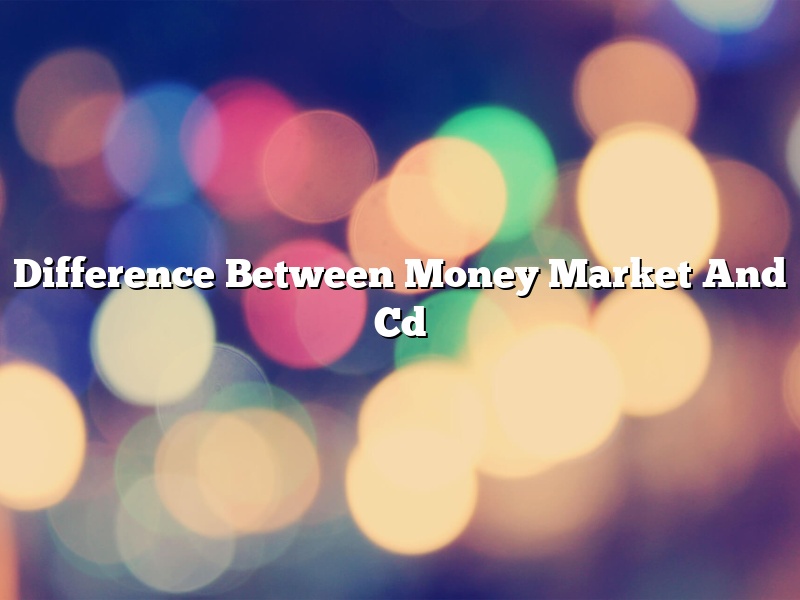When it comes to investing, there are a variety of different options to choose from. Two popular investment vehicles are money market accounts and certificates of deposit, or CDs. Though both have similarities, there are key differences between the two.
Money market accounts are typically offered by banks, and they allow you to deposit money and then access it easily, often through checks or a debit card. The interest rates on money market accounts are variable, meaning they can change over time. Additionally, you may be able to write checks against the account or use a debit card to withdraw money.
Certificates of deposit, or CDs, are offered by banks and credit unions. With CDs, you deposit money for a set period of time, typically six months or a year, and you earn a fixed interest rate on that money. You may not access the money deposited in a CD for the duration of the term, though some CDs allow for an early withdrawal without penalty.
The key difference between money market accounts and CDs is that money market accounts offer more flexibility, in that you can access your money more easily, while CDs offer a higher interest rate. If you need immediate access to your money, a money market account is a better option; if you’re willing to lock your money away for a fixed period of time, a CD can provide a higher return.
Contents
- 1 What is the difference between CD and money market?
- 2 Why would you choose a CD over a money market account?
- 3 Can you lose money in a CD account?
- 4 Which is safer CD or money market?
- 5 Is putting money in a CD worth it?
- 6 What is the best way to invest 30000 dollars?
- 7 How much does a 10000 CD make in a year?
What is the difference between CD and money market?
In basic terms, a certificate of deposit (CD) is a savings account with a bank in which the depositor agrees to leave the money in the account for a set period of time, usually six months to five years. In return, the bank pays the depositor a higher interest rate than is available on a regular savings account.
A money market account is a type of savings account that pays a higher interest rate than a regular savings account, but the interest rate is usually lower than that paid on a CD. A money market account is also a type of account in which the depositor may write checks against the account balance and use a debit card to withdraw money.
One key difference between a CD and a money market account is that a CD is a fixed-rate account, whereas the interest rate on a money market account may change from time to time. Another key difference is that a CD must be held for a set period of time, whereas money may be withdrawn from a money market account at any time.
Why would you choose a CD over a money market account?
A CD, or certificate of deposit, is a savings account that offers a higher interest rate than a traditional savings account. A money market account, on the other hand, is a type of checking account that typically offers a higher interest rate than a traditional checking account.
So why would you choose a CD over a money market account?
There are a few reasons. First, a CD offers a fixed interest rate, which means your interest rate will not change over the life of the CD. A money market account, on the other hand, may offer a variable interest rate, which means that your interest rate could change at any time.
Second, a CD typically has a longer maturity date than a money market account. This means that you cannot withdraw your money from a CD until the maturity date has passed. A money market account, on the other hand, allows you to withdraw your money at any time.
Finally, a CD typically requires a larger minimum deposit than a money market account. This means that you need to have a larger amount of money saved up in order to open a CD account.
So which account is right for you?
It depends on your needs and goals. If you are looking for a savings account that offers a fixed interest rate and you don’t need to access your money immediately, a CD may be a good option for you. If you are looking for a checking account that offers a higher interest rate than a traditional checking account, a money market account may be a good option for you.
Can you lose money in a CD account?
It’s a question that’s been on many people’s minds in recent years: can you actually lose money in a CD account? The answer is yes, it is possible to lose money in a CD account, though it’s not common.
How can you lose money in a CD account? The most common way is if you withdraw your money from the account before the CD matures. If you do that, you may have to pay a penalty, which can eat into your principal balance and cause you to lose money.
Another way to lose money in a CD account is if the interest rate falls below the rate of inflation. In that case, you may end up losing purchasing power, even if you don’t withdraw your money from the account.
So, can you lose money in a CD account? Yes, it’s possible, but it’s not likely. If you’re careful with your money and you pick a CD with a good interest rate, you shouldn’t have anything to worry about.
Which is safer CD or money market?
When it comes to savings, there are a few different options to choose from, each with their own benefits and drawbacks. Two of the most popular choices are certificates of deposit (CDs) and money market accounts (MMAs). Here’s a look at how each one compares:
CDs
CDs are a type of savings account that offer a fixed interest rate for a set period of time. This can be a great option if you’re looking for a guaranteed return on your investment. However, you may not be able to access your money until the CD matures, and you may also be subject to penalties if you withdraw your money early.
Money Market Accounts
MMAs are a type of savings account that offer a higher interest rate than traditional checking or savings accounts. This can be a great option if you’re looking for a place to store your money that will offer a better return than a checking account. However, MMA interest rates can vary, and there may be limits on how many withdrawals you can make each month.
Is putting money in a CD worth it?
When it comes to saving money, there are a lot of options to choose from. But what’s the best way to save your money? Is putting money in a CD worth it?
There are a few things to consider when deciding whether or not to put your money in a CD. The first is how long you’re willing to wait to get your money back. Most CDs have a maturity date, which is the date when you can request your money back. If you need the money before the maturity date, you may have to pay a penalty.
The next thing to consider is the interest rate. The interest rate is how much money the bank pays you for letting them hold your money. The higher the interest rate, the more money you’ll make on your CD.
Finally, you need to decide how much money you want to put in the CD. The minimum amount you can put in a CD is usually $500, but the more money you put in, the higher the interest rate you’ll get.
So is putting money in a CD worth it? It depends on your needs and how long you’re willing to wait to get your money back. If you’re looking for a safe place to store your money and you’re not in a hurry to get it back, a CD is a good option. But if you need the money sooner, you may want to look for a different way to save your money.
What is the best way to invest 30000 dollars?
There are a number of different options when it comes to investing 30000 dollars. It is important to carefully consider each option and choose the one that is the best fit for your specific goals and needs.
One option is to invest in stocks. This can be a relatively risky option, but it also has the potential for high returns. You can research individual stocks or invest in a mutual fund or exchange-traded fund.
Another option is to invest in real estate. This can be a more stable option than stocks, and there are a number of different ways to do it. You can purchase a property and rent it out, or you can invest in a real estate investment trust.
You could also choose to invest in bonds or CD’s. These are typically more stable investments than stocks or real estate, but they also offer lower returns.
It is important to think about your specific goals and needs when deciding how to invest 30000 dollars. Talk to a financial advisor to get help narrowing down your options and choosing the best option for you.
How much does a 10000 CD make in a year?
CDs, or compact discs, were once a popular way to listen to music. But with the rise of mp3s and other digital formats, the CD has largely gone the way of the cassette tape.
Even so, there are still a number of people who prefer to listen to music on CDs. And if you have a large collection of CDs, you may be wondering how much money you can make from them.
In this article, we’ll take a look at how much money you can make from selling CDs. We’ll also look at how much you can expect to earn per CD, and how to best market your CDs to potential buyers.
How Much Money Can You Make Selling CDs?
There’s no easy answer to this question, as it largely depends on the demand for CDs and the condition of your discs.
However, as a general rule, you can expect to earn between $0.50 and $2.00 per CD, depending on the condition and genre of the CD.
So, if you have a collection of 10000 CDs, you could expect to earn between $5000 and $20,000 per year.
How to Sell CDs
There are a number of ways to sell your CDs. You can sell them online, at flea markets, or through consignment stores.
Online
The easiest way to sell your CDs is online. There are a number of websites that allow you to sell CDs, including eBay and Amazon.
eBay is probably the best option, as it has a large audience of buyers. You can list your CDs on eBay for a set price, or you can auction them off to the highest bidder.
Amazon also allows you to sell CDs, and it offers a few advantages over eBay. For one, Amazon allows you to sell used CDs, which can be a great way to attract buyers. Amazon also allows you to sell music downloads, which can be a great way to boost sales.
Flea Markets
Flea markets are another great option for selling CDs. Flea markets are a great way to reach a large number of buyers, and they’re also a great way to get rid of old CDs that you no longer want.
The downside to flea markets is that you typically won’t make as much money per CD as you would online or through consignment stores. However, flea markets can be a great way to get rid of old CDs and to make a little extra money.
Consignment Stores
Consignment stores are a great option for selling high-end CDs. If you have a collection of rare or out-of-print CDs, consignment stores may be the best option for you.
The downside to consignment stores is that you typically won’t make as much money as you would online or through flea markets. However, consignment stores can be a great way to sell high-end CDs and to make a little extra money.
How to Price Your CDs
When pricing your CDs, it’s important to consider the condition of the discs and the demand for them.
As a general rule, you should price your CDs at the lower end of the spectrum if they’re in bad condition or if the demand for them is low. Conversely, you should price your CDs at the higher end of the spectrum if they’re in good condition and if the demand for them is high.
It’s also important to price your CDs based on the genre of music they represent. For example, you can expect to earn more for jazz CDs than you can for pop CDs.
Conclusion
In




